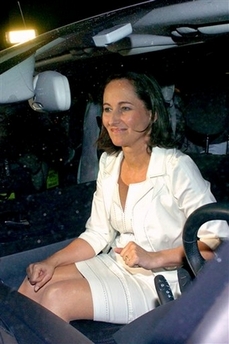Sarkozy, Royal set up French election runoff
(AP)Updated: 2007-04-23 06:23
PARIS - Conservative Nicolas Sarkozy and Socialist Segolene Royal appeared headed Sunday to a presidential runoff, preliminary results showed, setting up a stark choice between one of France's most intensely ambitious politicians and a liberal who would be the country's first female leader.
In the May 6 runoff, Sarkozy should be able to count on votes from the far right, whose champion, Jean-Marie Le Pen, suffered one of his worst showings in the five presidential elections he has contested. Preliminary results had him at 11 percent.
Royal can expect support from parties to her left, which swung behind her after their candidates were eliminated.
But the scramble is now on for voters in the middle ground of French politics and others who deserted the left and right in favor of Francois Bayrou, the farmer's son and lawmaker who was one of the campaign's big surprises.
He placed third on Sunday, with 18 percent of the vote, according to the preliminary results. Given Sarkozy's apparent strength, Royal would have to pick up a strong majority of Bayrou's supporters to win.
Either way, France gets its first president born after World War II.
Both Sarkozy, a Hungarian immigrant's son, and Royal, a military officer's daughter who beat Socialist heavyweights to win her party's nomination, have worked hard to get to this point - one step away from taking over one of Europe's biggest economic, military and diplomatic powers.
But France also is a nation deeply troubled, still haunted by riots by young blacks and Arabs in poor neighborhoods in 2005. Decades of high unemployment, increasing competition from more dynamic economies like China's, and a sense that France is losing influence in the world made this a passionate campaign.
Sarkozy, who last week cited Martin Luther King, told a cheering crowd of supporters Sunday night that he wants to unite the nation around "a French dream."
By choosing him and Royal, voters "clearly marked their wish to go to the very end of the debate between two ideas of the nation, two programs for society, two value systems, two concepts of politics," said Sarkozy, a former interior minister.
Royal also said the May 6 vote offered "a clear choice between two very different paths."
"France is going to choose its destiny and its face," she said. "I invite you to invent a new France."
Outside Socialist Party headquarters in Paris, supporters reacted to the result with joy and chants of "We're going to win!"
"They said 'Sarko' was unbeatable. With a result like that, he's totally beatable," said Claude Dorey, a teacher.
The turnout rate was heading over 80 percent, nearing the record of 84.8 percent set for a first round in 1965. The intense interest testified to the high stakes for France and the personalities - inspiring for some, divisive for others - involved in an election that was wrapped in surprises and suspense.
Voters seized on the election as an opportunity to steer their nuclear-armed but anxious nation on a new course, after 12 years under Jacques Chirac, 74, who declined to run.
Many voters also were determined to avoid a repeat of the shame they felt in 2002, when a record low turnout helped Le Pen, an extreme-right nationalist with repeat convictions for anti-Semitic and racist comments, slip through into the runoff. Even voters on the left rallied around the conservative Chirac to keep Le Pen from power in that vote, and he was trounced.
On Sunday, many were determined not to make the same mistake.
"If the French people didn't learn the lesson from last time, then we really are jerks," said Corinne Keuter, a 46-year-old secretary who lined up for a half-hour to cast her ballot for Royal in northwest Paris. She said she could not remember having waited so long to vote since Socialist Francois Mitterrand was elected in 1981.
Whatever the final outcome, "I think this election is going to change things for the better," she said. "In 2002, people didn't seem to care."
A dejected Le Pen, who accuses both the left and right of leading France toward ruin, reacted to the result with sarcasm.
"I thought the French were rather unhappy ... I was mistaken," he said. "The French are very content. The proof is that they have just re-elected the parties that were in power and that are responsible for the situation of France."
|
||
|
||
|
|

